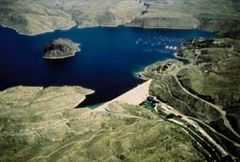Elephant Butte Reservoir
| Elephant Butte Reservoir | |
|---|---|
 Elephant Butte Reservoir and Dam | |
| Location | Sierra County, New Mexico |
| Coordinates | 33°09′14″N 107°11′32″W / 33.153969°N 107.192113°WCoordinates: 33°09′14″N 107°11′32″W / 33.153969°N 107.192113°W |
| Lake type | Hydroelectric reservoir |
| Primary inflows | Rio Grande |
| Primary outflows | Rio Grande |
| Basin countries | United States |
| Surface area | 36,500 acres (14,800 ha) |
| Water volume | 2,065,010 acre·ft (2.54715 km3) |
| Surface elevation | 4,414 ft (1,345 m) |
Elephant Butte Reservoir is a reservoir on the Rio Grande in the U.S. state of New Mexico, 5 miles (8.0 km) north of Truth or Consequences. This reservoir is the 84th largest man-made lake in the United States and the only place in New Mexico where one can find pelicans perched on or alongside the lake. There are also temporary US Coast Guard bases stationed at Elephant Butte. It is impounded by Elephant Butte Dam and is the largest reservoir in New Mexico. The reservoir is also part of the largest state park in New Mexico, Elephant Butte Lake State Park.[1]
The reservoir is part of the Rio Grande Project, a project to provide power and irrigation to south-central New Mexico and west Texas. It was filled starting between 1915 and 1916.[2]
The reservoir can hold 2,065,010 acre feet (2.54715×109 m3) of water[2] from a drainage of 28,900 square miles (74,850 km²).[3] It provides irrigation to 178,000 acres (720 km²) of land.[2]
The name "Elephant Butte" refers to a volcanic core similar to Devils Tower in Wyoming. It is now an island in the lake. The butte was said to have the shape of an elephant.
Fishing is a popular recreational activity on the reservoir, which contains striped bass, white bass, largemouth bass, crappie, walleye and catfish.
History and dam construction
Elephant Butte Dam, constructed between 1911 and 1916, with the reservoir fill started in 1915, was a major engineering feat in its day. The enormous concrete dam is the major feature of the Elephant Butte National Register Historic District. New Mexico State Parks operates a visitor center that contains information on the construction of the dam. At the time of its construction, the dam was the largest irrigation dam ever built with the exception of the Aswan Dam in Egypt.
A large construction community sprang up, which included worker camps, railways, water tanks, cableway systems, and the former administration building of the Bureau of Reclamation. The "camps" housed American and Mexican workers throughout the construction of the dam. Many of the former camps ended up under the reservoir itself, while others disappeared altogether.
The former administration building of the Bureau of Reclamation still stands as a bed and breakfast facility, and, along with other structures of the time, are listed in the National Register of Historic Places.[4] When the lake falls over 10 meters (30 feet) below maximum capacity, the ruins of an old machine shop rise out of the water.[5] Located near the south-east shore, this 3000 square-foot concrete structure was once believed to be the remnants of the old field hospital that served the frequently injured dam construction crew. That building is located further upstream in the aptly named 'Hospital Canyon'. Plans are underway to make the machine shop ruins a scuba destination in years of high water-level.[6]


External links
References
- ↑ "Elephant Butte Reservoir". USDOI data. Bureau of Reclamation. May 1, 2004. Retrieved September 2, 2008.
- ↑ 2.0 2.1 2.2 "Elephant Butte Powerplant". Rio Grande Project. Bureau of Reclamation. December 28, 2005. Archived from the original on September 26, 2006. Retrieved October 11, 2006.
- ↑ "Elephant Butte Dam". Dataweb. Bureau of Reclamation. August 22, 2006. Retrieved October 11, 2006.
- ↑ "History of Elephant Butte". HHEB data. New Mexico Energy, Minerals, and Natural Resources Department. Aug 2, 2006. Retrieved February 21, 2012.
- ↑ "The Legend of the Hospital at the bottom of Elephant Butte Lake". SCNM. Sierra County, NM. February 10, 2013. Retrieved April 25, 2012.
- ↑ "Mystery Building of Elephant Butte". Jonsered. Urban Exploration Resource. September 25, 2009. Retrieved February 22, 2012.